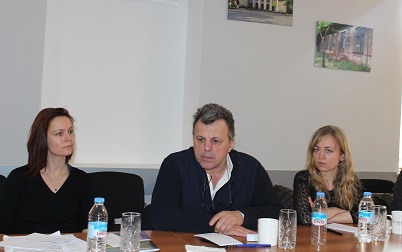Lado Bitchashvili, Shida Kartli
International Federation for Human Rights (FIDH) and its member organization in Georgia Human Rights Center (HRIDC) released special report ten years after the 2008 Russian-Georgian War – “Living on the Edge: Victims’ Quest for Accountability – the ongoing impact of the 2008 Russia-Georgia War”. The report was launched in Tbilisi on February 5 and in Gori on February 7.
The report together with the grave stories of the war victims evaluates the legal aspects of the war, with regard to investigation into the crimes committed during the war on national and international levels.
President of the FIDH Dimitris Christopoulos, Deputy Head of International Justice Desk, FIDH, Delphine Carlens, representative of the Europe and Central Asia Desk at FIDH Julia Ouahnon and deputy executive director of Human Rights Center Nino Tlashadze presented the report to the representatives of local NGOs and war victims in the Gori Democracy School.
“The armed conflict in the summer of 2008 saw attacks against the civilian population, which resulted in murders, forcible transfers of population, persecutions on ethnic grounds; as well as attacks intentionally targeting peacekeepers, the destruction of property, and pillaging. According to a mission of the European Union, the conflict resulted in 850 deaths and more than 100,000 internally displaced persons,” the report reads, which describes the life in the conflict affected villages 10 years after the war.
“While no perpetrator of crimes against humanity committed 10 years ago has been charged, the survivors of this war continue to suffer from kidnappings, detentions, and extortion on a daily basis due to the shifting demarcation line, which is not recognised by the international community. Considering that Russian authorities refuse to effectively cooperate with the ICC today, victims of 2008 have to learn to live in precarious conditions, an unsafe environment while crimes go unpunished”, the report reads.
Victims of the Georgia-Russian war, representatives of local NGOs and civil society attended the presentation in the Gori Democracy School. The presentation was followed by the discussion, where several issues were discussed.
One of the participants of the meeting Lia Chlachidze paid particular attention on the ongoing investigation process ten years later after the war and noted that many victims of the war have already passed away.
“It was hard but also interesting to read the joint report of FIDH and its member organization Human Rights Center. The war victims still live in very grave conditions. People living alongside the ABL are still waiting for the investigation results, though the process is dragged out. Number of witnesses of war crimes is reducing – many of them have already died and could not see the justice. The studies and missions are good and necessary but we are more eager to see the results. The ICC shall first of all grant victim status to us, which will restore our motivation and hope for justice. The perpetrators for the war crimes shall be identified and punished. Also, a special conclusion shall be delivered which will assess impact of the war on us. The projects shall be implemented to provide victims with medical, psychological and material assistance,” chairperson of the NGO Ergneti Lia Chlachidze said.
President of FIDH Dimitris Christopoulos stated that ten years after the war, opening of the ICC local office in Tbilisi in the beginning of 2018 shall have positive impact on the investigation, which will identify the responsible persons for the war crimes.
“The joint report reviews the current conditions of the 2008 war victims. The report has two addressees, one of them is the Government of Georgia. We recommend them to pay particular attention to the population living in the conflict zone, to create all conditions for their honorable life. Another addressee of our recommendations is the ICC, which shall accelerate the investigation and give priority to the investigation of the alleged war crimes committed during 2008 war in Georgia,” FIDH President stated.
Representative of Human Rights Center said the report pays particular attention to the investigation into alleged war crimes, which are still acute ten years after the war and the war victims are still waiting for the punishment of perpetrators.
“In the frame of joint missions in 2016 and 2017 we met victims of 2008 war. We interviewed people, who still live in grave economic conditions. The purpose of the report is to underscore importance of timely investigation into the war crimes on the national and international levels. We would like to remind the ICC that the victims of the war still face hard social-psychological problems and we recommend the Court to prioritize the investigation in Georgia in order to see the results as soon as possible. We appreciate that first time in its history the ICC opened investigation in the territory outside Africa, in Europe and it happened in Georgia. It is the first fact when the Court is investigating the war crimes committed in the territory of Europe,” deputy executive director of Human Rights Center Nino Tlashadze said.
Russian authority does not recognize the ongoing investigation by the ICC and does not cooperate with them. Nevertheless, the ICC commenced the investigation and opened local office in the capital of Georgia, because the war crimes were committed in the territory of Georgia, which is part of the Rome Statute.
Opening of the ICC local office in Tbilisi gave another hope to the war victims, who state that it restored their trust to the investigation.
On 27 January 2016, the ICC opened an investigation into the international crimes committed during the war between Georgia, Russia, and Ossetian forces in the summer of 2008. This was the first ICC investigation into a non-African conflict. The serious war crimes and crimes against humanity, together with the lack of genuine national investigations and prosecutions, brought the ICC to authorise the opening of an investigation.
News
December 13, 2023
Ethnic minorities outside the peace dialogue
November 6, 2023
‘Peace’ agenda of political parties
Popular
Articles
February 13, 2024




